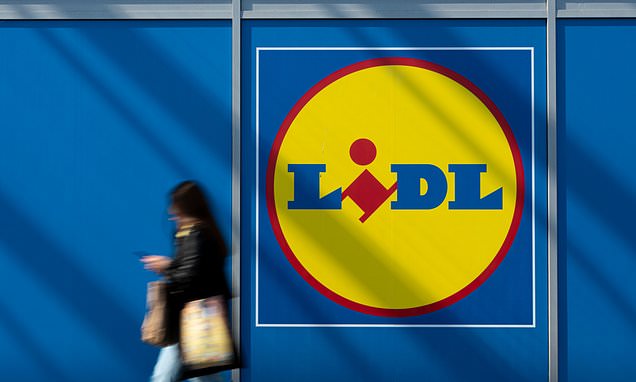
- Lidl relies on external loans from banks for ‘at least half’ its financing
- That will act as a drag on future expansion plans
- Lidl has almost £3bn of debts due to be repaid in the next five years
Lidl’s UK arm has been hit by a surge in its borrowing costs, threatening its previously relentless rise.
The German discount supermarket’s British operation plunged into the red after the interest bill on its debts almost trebled to £108 million.
It marks the first serious setback for Lidl in its foray into the UK market.
Along with fellow no-frills rival Aldi, it has revolutionised food retailing in the last two decades.
The pair account for £1 of every £5.50 spent in supermarkets.
Millions of cash-strapped shoppers have deserted the more expensive traditional grocers during the cost-of-living squeeze.
Both are privately-owned. Lidl is controlled by the Schwarz family and Aldi by the Albrechts.
This allows them to take a long-term view and absorb any losses, experts say.
But unlike Aldi, which is funded entirely by its family owners, Lidl relies on external loans from banks for ‘at least half’ its financing, according to Marc Houppermans, of Dusseldorf-based Discount Retail Consulting. That will act as a drag on Lidl’s future expansion plans, he added.
‘Theo Albrecht [co-founder of Aldi] always said that when interest rates rose Lidl would be in trouble,’ said Houppermans.
Lidl, which is still growing at almost 20 per cent, has almost £3 billion of debts due to be repaid in the next five years. It has recently slowed its store opening programme and laid off staff in its property buying division.
Lidl, which has expanded to 960 stores and recently opened its largest ever warehouse, in Luton, is not the only major supermarket to grapple with soaring debt servicing costs.
Asda and Morrisons were saddled with huge borrowings when they were bought by private equity groups just before the grocery market was hit by soaring food and energy prices.
The pair paid a total of £900million in interest charges last year, wiping out profits, accounts show. The fact Morrisons and Asda have more debt under private equity owners ‘undoubtedly’ impacts on their ability to compete, said retail consultant Richard Hyman.
‘The change in ownership and a different financial structure has tied their hands to a degree,’ he said. ‘You saw that with petrol, where Asda was always the price leader but that’s no longer the case.’
Related Articles
HOW THIS IS MONEY CAN HELP
Morrisons, which last week hired the ex-boss of Carrefour France Rami Baitieh to succeed David Potts as chief executive, saw its debts balloon to £8 billion after its takeover by buy-out group Clayton, Dubilier & Rice (C&DR).
Borrowings have since fallen to £5.4 billion, Morrisons told investors last week.
Asda, the UK’s third largest grocer, is owned by the Issa brothers and private equity business TDR and has debts of £7.4 billion. These are expected to rise following its recent debt-fuelled acquisition of the EG’s petrol forecourts business from the Issas.
Analysts say market leaders Tesco and Sainsbury’s are better placed to cope with rising borrowing costs because they also have access to shareholder equity as another source of funding. Houppermans, who used to run Aldi in the Netherlands, also questioned Morrisons’ appointment of Baitieh, claiming he had ‘no experience’ of competing with discounters.
Baitieh has promised a five-point turnaround plan, though details are unlikely to emerge before he starts his new job in November. Morrisons, which last year was overtaken by Aldi as the fourth largest grocer, declined to comment.
Lidl UK chief executive Ryan McDonnell recently said there was ‘no ceiling’ on its expansion plans. And a spokesman added: ‘Keeping prices low is a commitment we will always keep for our customers.’
Asda said it remained the UK’s lowest-priced traditional supermarket and had to cut prices on hundreds of popular products by an average of 11 per cent.
Its ‘sustainable capital structure, strong cash generation and clear strategy to grow’ profits would enable it to reduce its debt ‘over time’, a spokesman added.
Lidl’s debt troubles come amid signs that the seemingly unstoppable rise of the discounters in the UK could be starting to lose momentum. Last month data from Kantar showed that Aldi’s slice of the market fell from 10.2 per cent to 10.1 per cent in the 12 weeks to September 3, while Lidl’s share slipped to 7.6 per cent from 7.7 per cent.
It was Aldi’s first decline this year and the first in seven months for Lidl. Over the same period, Tesco saw its market share tick up from 27 per cent to 27.2 per cent.
Some links in this article may be affiliate links. If you click on them we may earn a small commission. That helps us fund This Is Money, and keep it free to use. We do not write articles to promote products. We do not allow any commercial relationship to affect our editorial independence.





